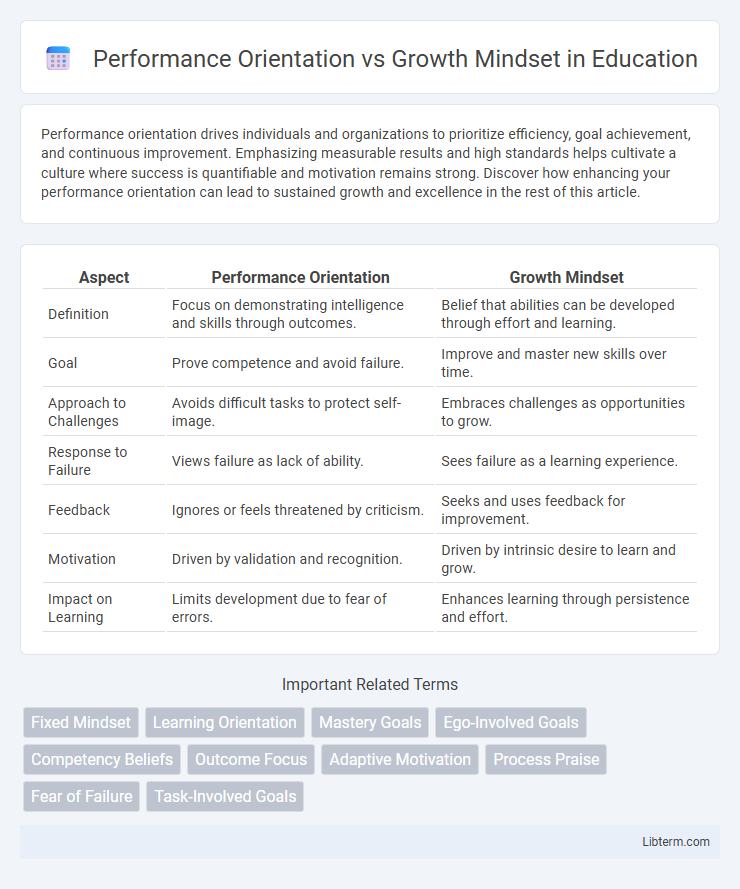Performance orientation drives individuals and organizations to prioritize efficiency, goal achievement, and continuous improvement. Emphasizing measurable results and high standards helps cultivate a culture where success is quantifiable and motivation remains strong. Discover how enhancing your performance orientation can lead to sustained growth and excellence in the rest of this article.
Table of Comparison
| Aspect | Performance Orientation | Growth Mindset |
|---|---|---|
| Definition | Focus on demonstrating intelligence and skills through outcomes. | Belief that abilities can be developed through effort and learning. |
| Goal | Prove competence and avoid failure. | Improve and master new skills over time. |
| Approach to Challenges | Avoids difficult tasks to protect self-image. | Embraces challenges as opportunities to grow. |
| Response to Failure | Views failure as lack of ability. | Sees failure as a learning experience. |
| Feedback | Ignores or feels threatened by criticism. | Seeks and uses feedback for improvement. |
| Motivation | Driven by validation and recognition. | Driven by intrinsic desire to learn and grow. |
| Impact on Learning | Limits development due to fear of errors. | Enhances learning through persistence and effort. |
Understanding Performance Orientation
Performance orientation emphasizes demonstrating competence and achieving favorable judgments from others, often prioritizing outcomes over learning processes. Individuals with a performance-oriented mindset tend to avoid challenges that risk failure and concentrate on proving their abilities rather than developing them. This approach can limit adaptability and long-term growth compared to a growth mindset, which values effort and learning from mistakes.
What is a Growth Mindset?
A growth mindset is the belief that abilities and intelligence can be developed through effort, learning, and perseverance. Unlike performance orientation, which focuses on proving innate talent and avoiding failure, a growth mindset encourages embracing challenges and viewing setbacks as opportunities for improvement. This approach fosters continuous personal development, resilience, and greater long-term achievement.
Key Differences Between Performance Orientation and Growth Mindset
Performance orientation centers on demonstrating competence and obtaining favorable judgments, often resulting in avoiding challenges that risk failure. Growth mindset emphasizes learning and effort, viewing abilities as developable through persistence, which encourages embracing challenges and resilience after setbacks. The key difference lies in the attitude toward failure: performance orientation aims to prove skill, while growth mindset seeks improvement and mastery.
Psychological Foundations of Each Approach
Performance orientation centers on demonstrating competence and receiving positive evaluations, driven by self-worth tied to outcomes. Growth mindset emphasizes the malleability of intelligence and abilities, fostering resilience through effort and learning from challenges. Psychological foundations reveal that performance orientation often triggers anxiety and fear of failure, while a growth mindset promotes intrinsic motivation and adaptive coping strategies.
Impact on Learning and Motivation
Performance orientation emphasizes demonstrating competence and achieving favorable judgments, which can limit learning by fostering fear of failure and avoidance of challenges. Growth mindset promotes viewing abilities as developable through effort, enhancing motivation by encouraging persistence and embracing challenges as opportunities for improvement. Research shows students with a growth mindset exhibit higher resilience and greater academic achievement compared to those driven primarily by performance goals.
Performance Orientation in the Workplace
Performance orientation in the workplace emphasizes achieving specific goals, meeting benchmarks, and excelling in measurable tasks. Employees with a strong performance orientation prioritize efficiency, productivity, and results, often seeking external validation and recognition. This mindset drives competition and accountability but may limit risk-taking and long-term innovation.
Growth Mindset and Personal Development
A growth mindset emphasizes continuous personal development by viewing challenges as opportunities to expand skills and knowledge. Individuals with this mindset persist through setbacks, believing effort directly influences improvement and success. This approach fosters resilience, adaptability, and a lifelong commitment to learning, essential for meaningful progress.
Overcoming Barriers to Adopting a Growth Mindset
Overcoming barriers to adopting a growth mindset involves recognizing and addressing fixed beliefs that limit learning and development. Emphasizing continuous effort, resilience, and the view that abilities can be developed through dedication shifts focus from performance orientation, which prioritizes proving competence. Strategies such as positive feedback, embracing challenges, and reframing failure as an opportunity for growth enhance the adoption of a growth mindset in personal and professional settings.
Cultivating Growth Mindset in Teams and Organizations
Cultivating a growth mindset in teams and organizations fosters resilience, continuous learning, and innovation by emphasizing effort, adaptability, and skill development over fixed abilities or immediate performance outcomes. Leaders who encourage experimentation, provide constructive feedback, and celebrate progress create an environment where employees are motivated to embrace challenges and develop their potential consistently. This approach enhances organizational agility, drives long-term success, and supports a culture of collaboration and improvement.
Choosing the Right Mindset for Lasting Success
Performance orientation emphasizes proving abilities and achieving specific outcomes, often leading to avoidance of challenges and fear of failure. Growth mindset encourages embracing challenges, learning from mistakes, and valuing effort, which fosters resilience and continuous improvement crucial for lasting success. Choosing a growth mindset cultivates adaptability, persistence, and a proactive approach, creating a foundation for sustainable achievement in personal and professional life.
Performance Orientation Infographic

 libterm.com
libterm.com